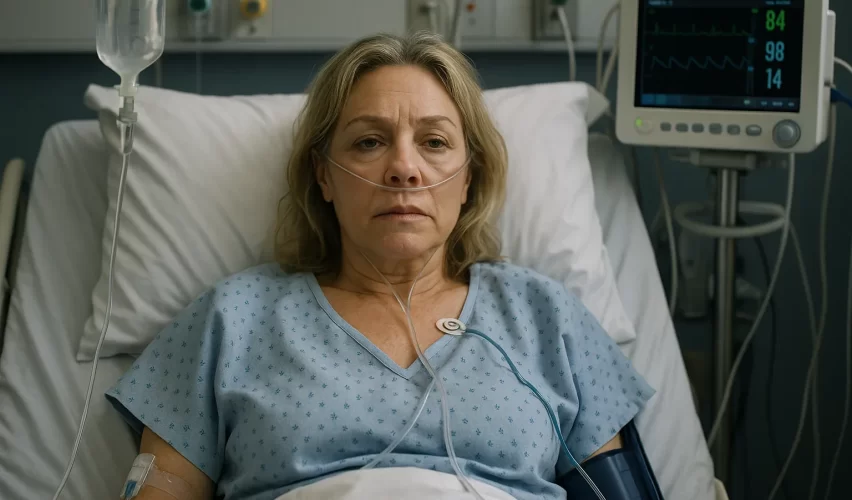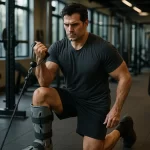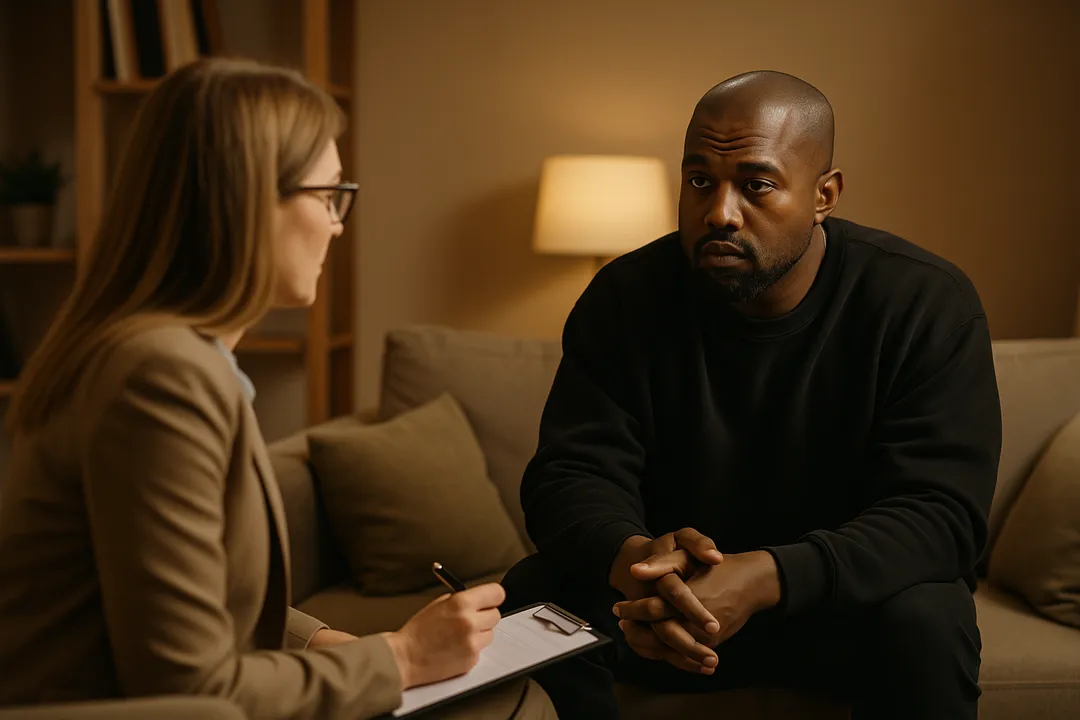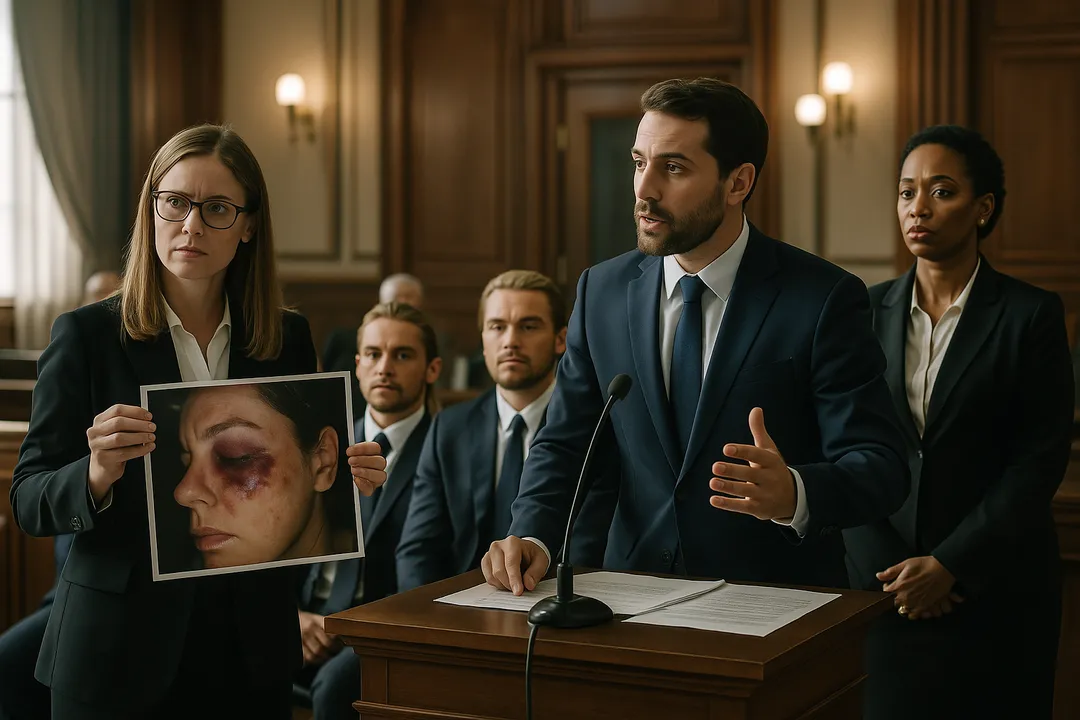Former reality television star Kate Gosselin’s recent hospitalization for a mysterious medical emergency has reignited discussions about celebrity health privacy, the long-term impacts of reality television fame on personal well-being, and the complex relationship between public figures and their audiences during health crises. The 50-year-old “Jon & Kate Plus 8” alum took to social media on September 30, 2024, to ask fans for prayers while sharing a photo of herself in a hospital bed connected to IV lines and monitoring equipment.
Gosselin’s cryptic social media posts, which included phrases like “Please pray for me tonight and tomorrow” and references to being “scared,” have left fans and media outlets speculating about the nature of her medical condition. The reality star later revealed that she underwent surgery described as one of the “top 3” most painful procedures, though she declined to specify what the operation was for, citing privacy concerns and potential legal implications.
This incident represents more than just another celebrity health scare—it highlights the evolving challenges that reality television personalities face in managing their public personas while dealing with private health issues. As we explored in our analysis of celebrity health scares that shook the world in 2025, the intersection of celebrity status, health privacy, and public curiosity creates unique pressures that can complicate both medical treatment and recovery processes.
The Medical Emergency: A Cry for Support
Kate Gosselin’s decision to share her hospitalization on social media while maintaining privacy about the specific medical details reflects the complex balance that celebrities must strike between public engagement and personal privacy during health crises. Her initial TikTok post, featuring a photo of herself in a hospital gown with medical equipment visible, was accompanied by a simple but powerful message asking for prayers and support.
The timing and nature of Gosselin’s social media disclosure raise important questions about how celebrities navigate health emergencies in the digital age. Her choice to share her hospitalization while withholding specific medical details demonstrates an awareness of both her audience’s concern and her own need for privacy during a vulnerable time.
Gosselin’s subsequent revelation that she underwent surgery described as one of the “top 3” most painful procedures provides some insight into the severity of her condition while still maintaining medical privacy. This approach reflects a growing trend among celebrities who seek to balance transparency with their audiences against the need to protect sensitive medical information that could have legal, financial, or personal implications.
The fact that Gosselin felt compelled to ask for prayers and support from her social media followers highlights the unique relationship that reality television stars develop with their audiences. Unlike traditional celebrities who maintain more distance from their fans, reality TV personalities often cultivate more intimate relationships with their viewers, creating expectations for sharing personal information that can become complicated during health crises.
The medical equipment visible in Gosselin’s hospital photos, including IV lines and monitoring devices, suggests that her condition required significant medical intervention and monitoring. The decision to share these images while maintaining privacy about the specific diagnosis reflects the careful balance that celebrities must maintain between public engagement and medical confidentiality.
Reality Television’s Long-term Health Impact
Kate Gosselin’s medical emergency occurs within the broader context of growing awareness about the long-term health impacts of reality television participation, particularly for individuals who spent years in the public eye during formative periods of their lives. The stress, scrutiny, and lifestyle changes associated with reality TV fame can have significant physical and mental health consequences that may not become apparent until years later.
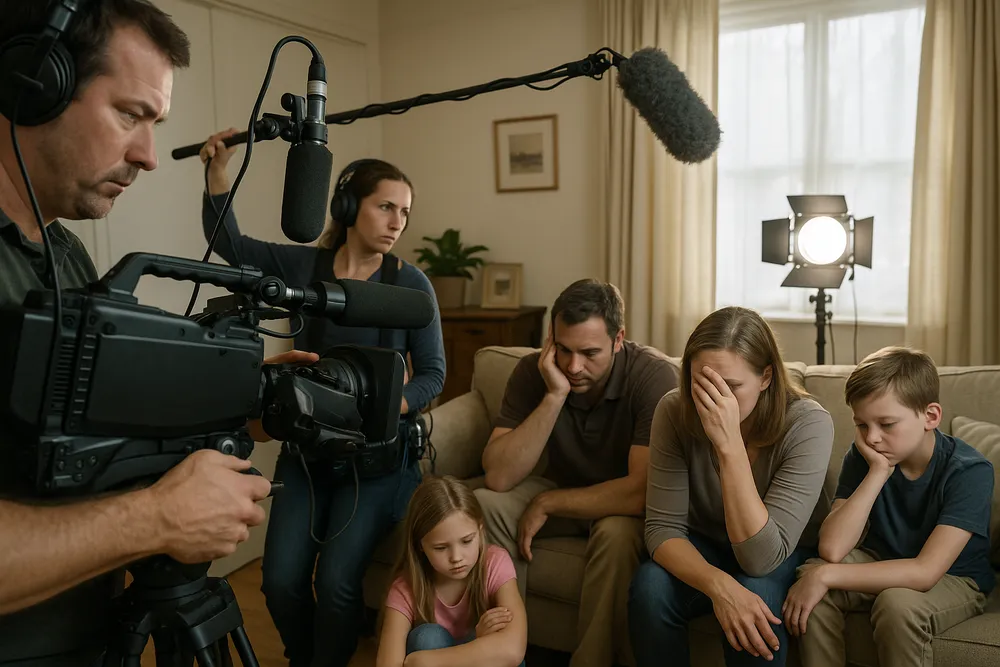
The “Jon & Kate Plus 8” phenomenon, which ran from 2007 to 2017 and documented the Gosselin family’s life with eight children, subjected Kate Gosselin to unprecedented levels of public scrutiny during some of the most challenging years of her life. The show documented not only the logistical challenges of raising eight children but also the deterioration of her marriage to Jon Gosselin, creating a perfect storm of personal and professional stress.
Research into the long-term effects of reality television participation has identified numerous potential health impacts, including chronic stress, anxiety, depression, and various stress-related physical conditions. The constant presence of cameras, the pressure to maintain entertaining storylines, and the loss of privacy can create sustained stress levels that may contribute to various health problems over time.
Gosselin’s case is particularly significant because she was not only a participant in reality television but also a primary caretaker for eight children while navigating the demands of television production. The combination of parenting stress, marital difficulties, and public scrutiny created a unique set of pressures that may have contributed to long-term health impacts.
The financial pressures associated with reality television can also contribute to health problems, as participants may feel compelled to continue participating in shows or related activities even when it may not be in their best interest from a health perspective. The need to maintain public relevance and income streams can create additional stress that compounds the existing health challenges associated with reality TV participation.
Celebrity Health Privacy in the Digital Age
Gosselin’s approach to sharing her medical emergency while maintaining privacy about specific details reflects the complex challenges that celebrities face in managing health information in the digital age. The expectation for transparency from public figures must be balanced against legitimate privacy concerns and the potential consequences of medical disclosure.
The legal implications of celebrity health disclosure can be significant, particularly when medical conditions might affect contractual obligations, insurance coverage, or future employment opportunities. Celebrities must carefully consider how medical information might be used by employers, insurance companies, or other parties when deciding what to share publicly.
The rise of social media has created new expectations for celebrity transparency that can complicate health privacy decisions. Fans and followers often expect regular updates and personal sharing from celebrities, creating pressure to disclose information that might previously have remained private. This expectation can be particularly challenging during health crises when celebrities may be dealing with uncertainty, fear, and the need to focus on recovery.
Gosselin’s decision to ask for prayers while maintaining medical privacy demonstrates one approach to managing these competing pressures. By acknowledging her health crisis and requesting support without providing specific medical details, she was able to engage with her audience while protecting sensitive information.
The potential for misinformation and speculation when celebrities share limited health information is another significant concern. Gosselin’s cryptic posts have led to widespread speculation about her condition, demonstrating how partial disclosure can sometimes create more problems than complete transparency or complete privacy.
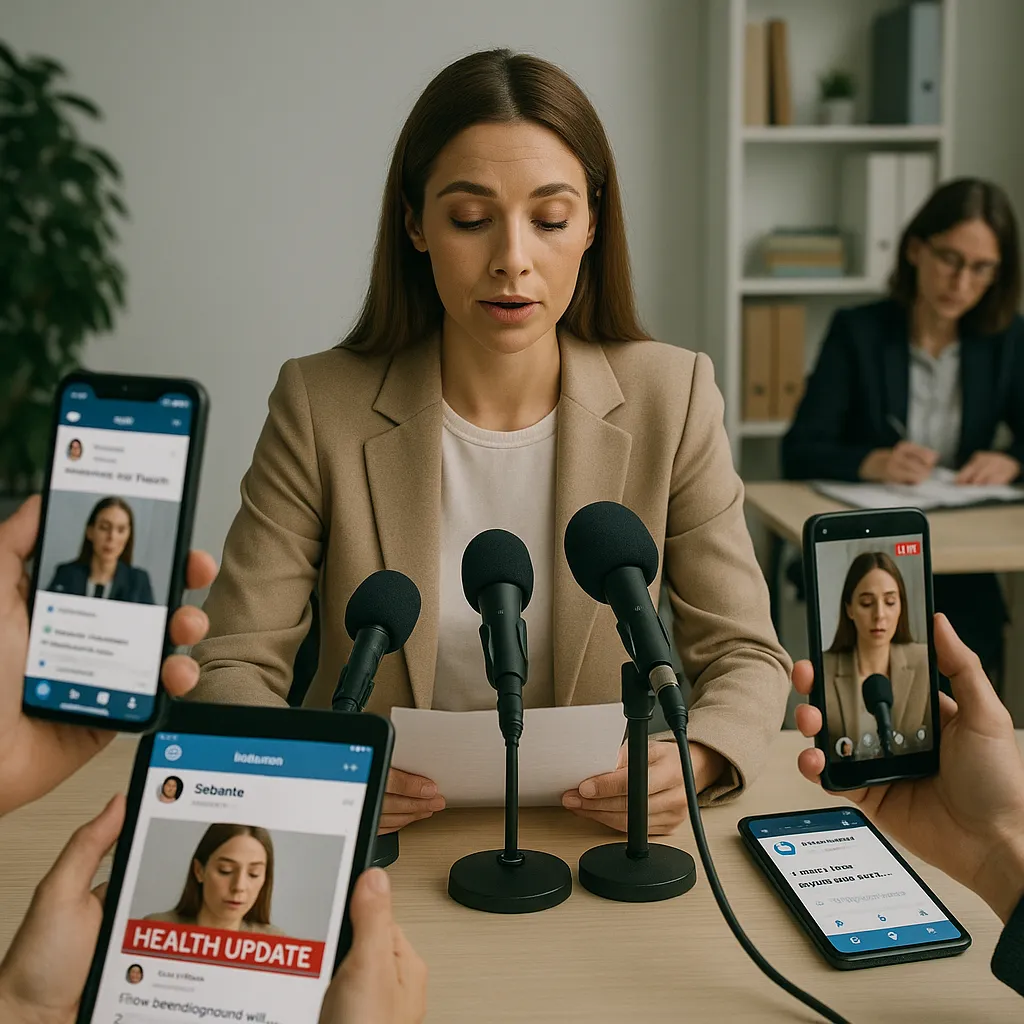
The Business of Celebrity Health Crises
The commercial implications of celebrity health emergencies extend far beyond immediate medical costs to encompass potential impacts on career opportunities, endorsement deals, and long-term earning potential. For reality television personalities like Gosselin, who have built their careers on public personas and audience relationships, health crises can have particularly significant business implications.
The entertainment industry’s approach to celebrity health issues has evolved significantly in recent years, with increased awareness of the need to balance commercial interests with genuine concern for celebrity well-being. However, the pressure to maintain public relevance and income streams can still create conflicts between health needs and business obligations.
Gosselin’s case is complicated by her status as a single mother of eight children, which creates additional financial pressures that may influence her decisions about health disclosure and treatment. The need to maintain income streams and public relevance while dealing with serious health issues creates a challenging balance that many celebrities must navigate.
The insurance implications of celebrity health issues can also be significant, particularly for individuals who rely on their physical appearance or ability to perform specific activities for their livelihood. The decision to disclose or withhold medical information can affect insurance coverage and claims, creating additional considerations that celebrities must weigh when making health-related decisions.
Medical Privacy Rights and Celebrity Status
The legal framework surrounding medical privacy becomes particularly complex when applied to public figures like Kate Gosselin, who have built their careers on sharing personal information with audiences. The Health Insurance Portability and Accountability Act (HIPAA) and other privacy laws provide important protections for medical information, but celebrities often face unique pressures to disclose health information that private individuals do not experience.
The expectation for celebrity transparency about health issues can create conflicts with fundamental privacy rights and medical confidentiality principles. While celebrities may choose to share health information voluntarily, they should not be compelled to do so simply because of their public status.
Gosselin’s approach to her medical emergency demonstrates an awareness of these privacy rights and the importance of maintaining control over personal medical information. Her decision to share her hospitalization while withholding specific details reflects a careful balance between public engagement and privacy protection.
The potential for health information to be used against celebrities in legal proceedings, employment decisions, or other contexts creates additional reasons for maintaining medical privacy. The entertainment industry has seen numerous cases where health information has been used inappropriately, highlighting the importance of protecting celebrity medical privacy rights.
The Role of Social Media in Celebrity Health Disclosure
Kate Gosselin’s use of TikTok to share her medical emergency reflects the growing role of social media platforms in celebrity health communication. These platforms provide celebrities with direct access to their audiences without the filter of traditional media, but they also create new challenges for managing health information and public expectations.
The immediacy and intimacy of social media can create pressure for real-time health updates that may not be appropriate or advisable from a medical or legal perspective. Celebrities may feel compelled to share information quickly to prevent speculation or misinformation, but this pressure can lead to premature or inappropriate disclosures.
The visual nature of platforms like TikTok and Instagram can also create additional complications for celebrity health disclosure. Gosselin’s decision to share photos of herself in the hospital provided visual evidence of her condition while still maintaining privacy about specific medical details, demonstrating how visual social media can be used strategically for health communication.
The global reach and permanent nature of social media posts create additional considerations for celebrity health disclosure. Information shared on social media platforms can be accessed by anyone and may remain available indefinitely, creating long-term implications for privacy and reputation management.
Comparative Analysis with Other Celebrity Health Crises
Gosselin’s medical emergency can be compared to other recent celebrity health crises to understand broader patterns in how public figures manage health information and audience relationships during medical challenges. As documented in our analysis of the impact of social media on celebrity injury news coverage, celebrities have developed various strategies for managing health disclosure in the digital age.
Some celebrities choose complete transparency about their health conditions, using their platforms to educate audiences and advocate for medical research or awareness. Others maintain strict privacy about health issues, sharing minimal information or relying on representatives to communicate with the public.
Gosselin’s approach represents a middle ground that acknowledges her audience’s concern while protecting sensitive medical information. This strategy may be particularly appropriate for reality television personalities who have built intimate relationships with their audiences but still need to maintain appropriate boundaries around personal information.
The success of different approaches to celebrity health disclosure often depends on the specific circumstances of the health issue, the celebrity’s relationship with their audience, and the potential implications of disclosure for their career and personal life.
The Psychology of Celebrity Health Disclosure
The decision to share health information publicly involves complex psychological factors that can be particularly challenging for celebrities who are dealing with serious medical conditions while managing public expectations and career considerations. Gosselin’s request for prayers suggests a need for emotional support that extends beyond her immediate family and friends to her broader audience.
The therapeutic value of public support during health crises can be significant, but it must be balanced against the potential negative consequences of public disclosure. Celebrities may find comfort in sharing their struggles with supportive audiences, but they may also face criticism, unwanted advice, or exploitation of their vulnerability.
The pressure to maintain a positive public image during health crises can create additional psychological stress for celebrities. The expectation to appear strong and optimistic while dealing with serious medical issues can complicate the natural grieving and adjustment processes that accompany health challenges.
Gosselin’s acknowledgment of being “scared” represents a rare moment of vulnerability that may resonate with audiences who are dealing with their own health challenges. This type of authentic emotional sharing can create meaningful connections between celebrities and their audiences while also providing valuable support for the celebrity during difficult times.
Industry Response and Support Systems
The entertainment industry’s response to celebrity health crises has evolved significantly in recent years, with increased recognition of the need for comprehensive support systems that address both immediate medical needs and long-term career implications. However, the support available to reality television personalities may be different from that available to traditional celebrities with major studio or network backing.
Gosselin’s status as a former reality television star who has maintained a public presence through social media and occasional television appearances may limit her access to industry support systems that are available to currently active celebrities. This situation highlights the need for comprehensive support systems that extend beyond active employment relationships.
The development of celebrity health advocacy organizations and support networks has provided new resources for public figures dealing with health challenges. These organizations can provide guidance on health disclosure decisions, connect celebrities with appropriate medical resources, and offer emotional support during difficult times.
The insurance and legal support available to celebrities during health crises can vary significantly depending on their current employment status, contractual relationships, and personal financial resources. Former reality television stars like Gosselin may face particular challenges in accessing comprehensive support systems.
Long-term Implications for Celebrity Health Management
Kate Gosselin’s medical emergency and her approach to managing the public aspects of her health crisis may influence how other celebrities handle similar situations in the future. Her strategy of acknowledging the health issue while maintaining privacy about specific details provides a model that other public figures may choose to follow.
The increasing awareness of celebrity mental health and the long-term impacts of fame on personal well-being may lead to the development of new support systems and resources for public figures dealing with health challenges. The entertainment industry may need to develop more comprehensive approaches to celebrity health management that address both immediate medical needs and long-term well-being.
The legal and regulatory framework surrounding celebrity health privacy may also evolve in response to cases like Gosselin’s, with increased recognition of the need to protect public figures from inappropriate pressure to disclose medical information while still allowing for voluntary sharing when it serves legitimate purposes.
Conclusion
Kate Gosselin’s recent medical emergency and hospitalization represent more than just another celebrity health scare—they illuminate the complex challenges that reality television personalities and other public figures face when dealing with serious health issues in the digital age. Her approach to sharing her hospitalization while maintaining privacy about specific medical details demonstrates the careful balance that celebrities must strike between public engagement and personal privacy during vulnerable times.
The incident highlights the unique pressures that reality television stars face in managing their public personas while dealing with private health challenges. The intimate relationships that these personalities develop with their audiences create expectations for transparency that can complicate medical privacy decisions and recovery processes.
For the entertainment industry, Gosselin’s case serves as a reminder of the long-term health impacts that can result from reality television participation and the need for comprehensive support systems that extend beyond active employment relationships. The industry’s responsibility to support former participants who may be dealing with health issues related to their television careers is an evolving area that requires continued attention and development.
The broader implications of Gosselin’s case extend to all public figures who must navigate health challenges while maintaining their careers and public relationships. The balance between transparency and privacy, the role of social media in health communication, and the importance of maintaining appropriate boundaries during vulnerable times are relevant considerations for anyone in the public eye.
As the entertainment industry continues to evolve and the relationship between celebrities and their audiences becomes increasingly intimate through social media and other platforms, cases like Gosselin’s will likely become more common. The industry’s response to these challenges—in terms of support systems, privacy protections, and health management resources—will be crucial in ensuring that public figures can maintain their health and well-being while continuing to engage meaningfully with their audiences.
Explore additional resources on People Magazine, Yahoo Entertainment, NBC Right Now, and Extra TV.


